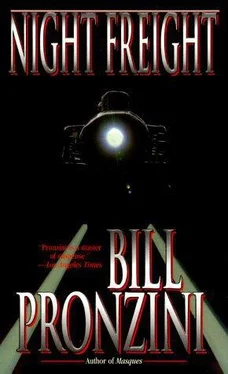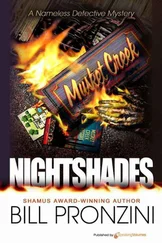Bill Pronzini - Night Freight
Здесь есть возможность читать онлайн «Bill Pronzini - Night Freight» весь текст электронной книги совершенно бесплатно (целиком полную версию без сокращений). В некоторых случаях можно слушать аудио, скачать через торрент в формате fb2 и присутствует краткое содержание. Год выпуска: 2000, ISBN: 2000, Издательство: Leisure Books, Жанр: Ужасы и Мистика, на английском языке. Описание произведения, (предисловие) а так же отзывы посетителей доступны на портале библиотеки ЛибКат.
- Название:Night Freight
- Автор:
- Издательство:Leisure Books
- Жанр:
- Год:2000
- ISBN:0843947063 (isbn13: 9780843947069)
- Рейтинг книги:5 / 5. Голосов: 1
-
Избранное:Добавить в избранное
- Отзывы:
-
Ваша оценка:
- 100
- 1
- 2
- 3
- 4
- 5
Night Freight: краткое содержание, описание и аннотация
Предлагаем к чтению аннотацию, описание, краткое содержание или предисловие (зависит от того, что написал сам автор книги «Night Freight»). Если вы не нашли необходимую информацию о книге — напишите в комментариях, мы постараемся отыскать её.
Night Freight — читать онлайн бесплатно полную книгу (весь текст) целиком
Ниже представлен текст книги, разбитый по страницам. Система сохранения места последней прочитанной страницы, позволяет с удобством читать онлайн бесплатно книгу «Night Freight», без необходимости каждый раз заново искать на чём Вы остановились. Поставьте закладку, и сможете в любой момент перейти на страницу, на которой закончили чтение.
Интервал:
Закладка:
I took a breath, let it out silently. He scraped back his chair as I did that, stood up, and jammed his hands into his coat pockets. Without looking at her, he said to the woman, "You pay for the food," and started past her table toward the restrooms in the rear.
She said, "Why the hell should I pay for it?"
He paused and glared back at her. "You've got all the money."
"I've got all the money? Oh, that's a laugh. I've got all the money!"
"Go on, keep it up." Then in a louder voice, as if he wanted to make sure I heard, he said, "Bitch." And stalked away from her.
She watched him until he was gone inside the corridor leading to the restrooms; she was as rigid as a chunk of wood. She sat that way for another five or six seconds, until the wind gusted outside, thudded against the door and the window like something trying to break in. Jerkily she got to her feet and came over to where I was at the sandwich board. Those cold lights still glowed in her eyes.
"Is his sandwich ready?"
I nodded and made myself smile. "Will that be all, ma'am?"
"No. I've changed my mind. I want something to eat too." She leaned forward and stared at the glass pastry container on the back counter. "What kind of pie is that?"
"Cinnamon apple."
"I'll have a piece of it."
"Okay—sure. Just one?"
"Yes. Just one."
I turned back there, got the pie out, cut a slice, and wrapped it in waxed paper. When I came around with it she was rummaging in her purse, getting her wallet out. Back in the restroom area, I heard the man's hard, heavy steps; in the next second he appeared and headed straight for the door.
The woman said, "How much do I owe you?"
I put the pie into the paper sack with the sandwich, and the sack on the counter. "That'll be three-eighty."
The man opened the door; the wind came shrieking in, eddying drafts of icy air. He went right on out, not even glancing at the woman or me, and slammed the door shut behind him.
She laid a five-dollar bill on the counter. Caught up the sack, pivoted, and started for the door.
"Ma'am?" I said. "You've got change coming."
She must have heard me, but she didn't look back and she didn't slow up. The pair of headlights came on out front, slicing pale wedges from the darkness; through the front window I could see the evergreens at the far edge of the lot, thick swaying shadows bent almost double by the wind. The shrieking rose again for two or three seconds, then fell back to a muted whine; she was gone.
I had never been more glad or relieved to see customers go. I let out another breath, picked up the flyer, and moved over to the cash register. Outside, above the thrumming and wailing, the car engine revved up to a roar and there was the ratcheting noise of tires spinning on gravel. The headlights shot around and probed out toward the county highway.
Time now to close up and go home, all right; I wanted a glass of brandy and a good hot fire more than ever. I went around to the tables they'd used, to gather up the coffee cups. But as much as I wanted to forget the two of them, I couldn't seem to get them out of my mind. Especially the woman.
I kept seeing those eyes of hers, cold and hateful like the wind, as if there was a black wind blowing inside her, too, and she'd been listening to it too long. I kept seeing her lean forward across the counter and stare at the pastry container. And I kept seeing her rummage in that big alligator purse when I turned around with the slice of pie. Something funny about the way she'd been doing that. As if she hadn't just been getting her wallet out to pay me. As if she'd been—
Oh my God , I thought.
I ran back behind the counter. Then I ran out again to the door, threw it open, and stumbled onto the gravel lot. But they were long gone; the night was a solid ebony wall.
I didn't know what to do. What could I do? Maybe she'd done what I suspicioned, and maybe she hadn't; I couldn't be sure because I don't keep an inventory on the slots of utensils behind the sandwich board. And I didn't know who they were or where they were going. I didn't even know what kind of car they were riding in.
I kept on standing there, chills racing up and down my back, listening to that black wind scream and scream around me. Feeling the cold sharp edge of it cut into my bare flesh, cut straight to the bone.
Just like the blade of a knife . . .
The editor who commissioned this story, Peter Crowther, specifically requested a horror tale set in the Old West which deals with a little-known superstition. I had a devil of a time (no pun intended) coming up with a suitable idea until I happened to be paging through a book on nineteenth-century village life, hunting inspiration. One of the chapters was entitled "The Coffin Trimmer "—a pleasant piece of nostalgia about a gentle, benign spinster who worked for a mortician in the author's hometown. My coffin trimmer, naturally, is anything but gentle, the superstition she represents is anything but benign, and what happens after her arrival in the village of Little River is anything but pleasant. . . .
The Coffin Trimmer
I'm scared.
I have never been so scared.
No one in Little River shares my terror. They refuse to listen to me, to open their eyes to the terrible truth. They call me a superstitious fool. Or tetched, or downright deranged. One day they will realize how blind they've been—the ones that are left. But by then it will be too late.
Lord have mercy on us all.
It doesn't make sense that Little River was chosen. Ours is no worse nor different than any other small northern California town. Dairy and beef cattle is what supports us; agricultural crops such as alfalfa, too. We have six saloons, a gambling house, and a whorehouse, compared to only three churches, but that doesn't mean there is much sin or even much impiety. There isn't. We haven't had a killing or any other major crime in nearly twenty years. Rowdyism is confined to Independence Day and once in a while when a cowhand off one of the ranches gets liquored up of a Saturday night. We're a God-fearing town of thirteen hundred and sixty-eight souls, according to the 1892 census. Good souls, with no more than a bucketful destined for a handshake with Satan on their judgment day.
Doesn't make sense, either, that it would start when Abe Bedford put up his new undertaking building. But it did, and no mistake. I used to believe everything that happened in this life had its clear-cut purpose and meaning, and if you studied on it long enough, looked at it in just the right way, you'd come to know or at least suspect what it was. Not this, though. No one can figure out the cause or reason for this—no one mortal, anyhow. And perhaps that's a blessing. I know too much already; I'm too scared as it is. I reckon I couldn't stand to know the rest of it too.
Abe Bedford buys all his rough pine boxes and fancier coffins from a casketmaker in the county seat. He used to store them in the barn back of his house on Oak Street. Had the coffins trimmed there, as well, by his wife Maude before she passed away and then by the Widow Brantley; he buys them without lining because it's thriftier that way. His embalming room and viewing parlor were in a rented building down on lower Main, near the train depot. He'd been the only undertaker in town for some while, but Little River was growing and Abe took to fretting that before long some other mortician would move in and open a fancy establishment and take away a good portion of his business. He came to the idea that what he had to do was build his own fancy establishment first, in a better location than lower Main—a place that was big enough for embalming and viewing, and to show off and store his caskets and rough boxes.
Читать дальшеИнтервал:
Закладка:
Похожие книги на «Night Freight»
Представляем Вашему вниманию похожие книги на «Night Freight» списком для выбора. Мы отобрали схожую по названию и смыслу литературу в надежде предоставить читателям больше вариантов отыскать новые, интересные, ещё непрочитанные произведения.
Обсуждение, отзывы о книге «Night Freight» и просто собственные мнения читателей. Оставьте ваши комментарии, напишите, что Вы думаете о произведении, его смысле или главных героях. Укажите что конкретно понравилось, а что нет, и почему Вы так считаете.












